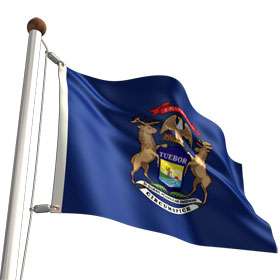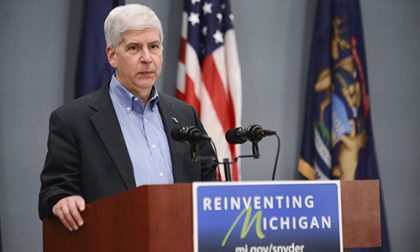Michigan Governor Rick Snyder Vetoes Online-Poker Measures
Michigan Governor Rick Snyder has vetoed three measures that collectively would have brought legalized online poker and other forms of online gambling to the state. Synder’s vetoes of House Bill 4926, the primary legalization bill, and two companion efforts likely ends the legalization battle for 2018. Though HB 4926 was passed by both Michigan’s House and Senate with veto-proof majorities, Governor Snyder’s veto came after the two legislative bodies concluded business for the 2018 session and year, with no plans to reconvene.
The three online-gambling measures vetoed by Snyder were among 40 passed bills nixed by Republican governor Snyder during his own last days in office. Snyder was unable to run for reelection due to term limits, and it is unknown how his successor, incoming Democratic Governor Gretchen Whitmer, will view the issue. HB 4926’s primary sponsor, State Rep. Brandt Iden, has promised to reintroduce the online-poker measures in late January, once Michigan’s legislature reopens for 2019 business.
 Gov. Snyder issued a statement about his veto of HB 4926 and the related measures. In the letter, Snyder cited pconcerns about cannibalism of business at the state-run lottery and at the state’s land-based casinos, this despite hard evidence to the contrary from other jurisdictions, such as New Jersey, that online offerings create complimentary revenue streams.
Gov. Snyder issued a statement about his veto of HB 4926 and the related measures. In the letter, Snyder cited pconcerns about cannibalism of business at the state-run lottery and at the state’s land-based casinos, this despite hard evidence to the contrary from other jurisdictions, such as New Jersey, that online offerings create complimentary revenue streams.
The heart of Snyder’s veto letter offered this:
“A significant amount of work went into these bills and getting them to a place where several stakeholders either expressed support or neutrality, and I appreciate that many pro-gaming stakeholders coalesced around these bills. However, due to largely unknown budgetary concerns, I believe this legislation merits more careful study and comparison with how other states have, or will, authorize online gaming. To be blunt, we simply don’t have the data to support this change at this time.
“Principally, gambling behavior could shift from the State’s ILottery program to internet-based gambling at casinos. In Fiscal Tear 2017, the lottery distributed $924.1 million to the School Aid Fund. For each $10 of spending on the lottery, the School Aid Fund receives approximately $2.76. Under HB 4926, because of its lower tax rate, each $10 in online betting translates into just four cents deposited into the School Aid Fund. Such a significant reduction, without a clearer understanding of internet gambling revenue growth potential, is concerning. Moreover, I am also concerned that revenues may be lost as gambling behavior shifts from on-premises, to online.
“Finally, I am concerned that the bills will encourage gambling by making it much easier to do so. I do not think it is appropriate to sign legislation that will effectively result in more gambling, with a reasonable chance that the state could lose revenue that could be helpful in dealing with social service issues that are ordinarily attendant to increased gambling behavior.”
Many of Snyder’s comments echo scare tactics spread in Michigan by the Sheldon Adelson-funded Coalition to Stop Internet Gambling (CSIG), which has fiercely opposed legalization efforts in several states. It remains to be seen — or to emerge — the extent to which CSIG’s lobbying impacted Snyder’s veto decisions.
HB 4926’s primary sponsor, Rep. Iden, expressed disappointment after learning of Snyder’s vetoes. “The governor just vetoed bills,” Iden said to SportsHandle. “I am surprised and disappointed. With this many stakeholders on board, it took us two years to get to this point, and it’s the first time in any state history that we had all the parties that were supportive of the bill (in agreement).”
Iden remains hopeful about chances for the same legislation in 2019, though he noted that educating new legislators on the topic (including incoming Governor Whitmer) represents a new challenge. In any event, Michigan’s near-miss leaves the count of legalized online-poker US states at four, with no immediate prospects for a fifth on the horizon in early 2019.




















COMMENTS